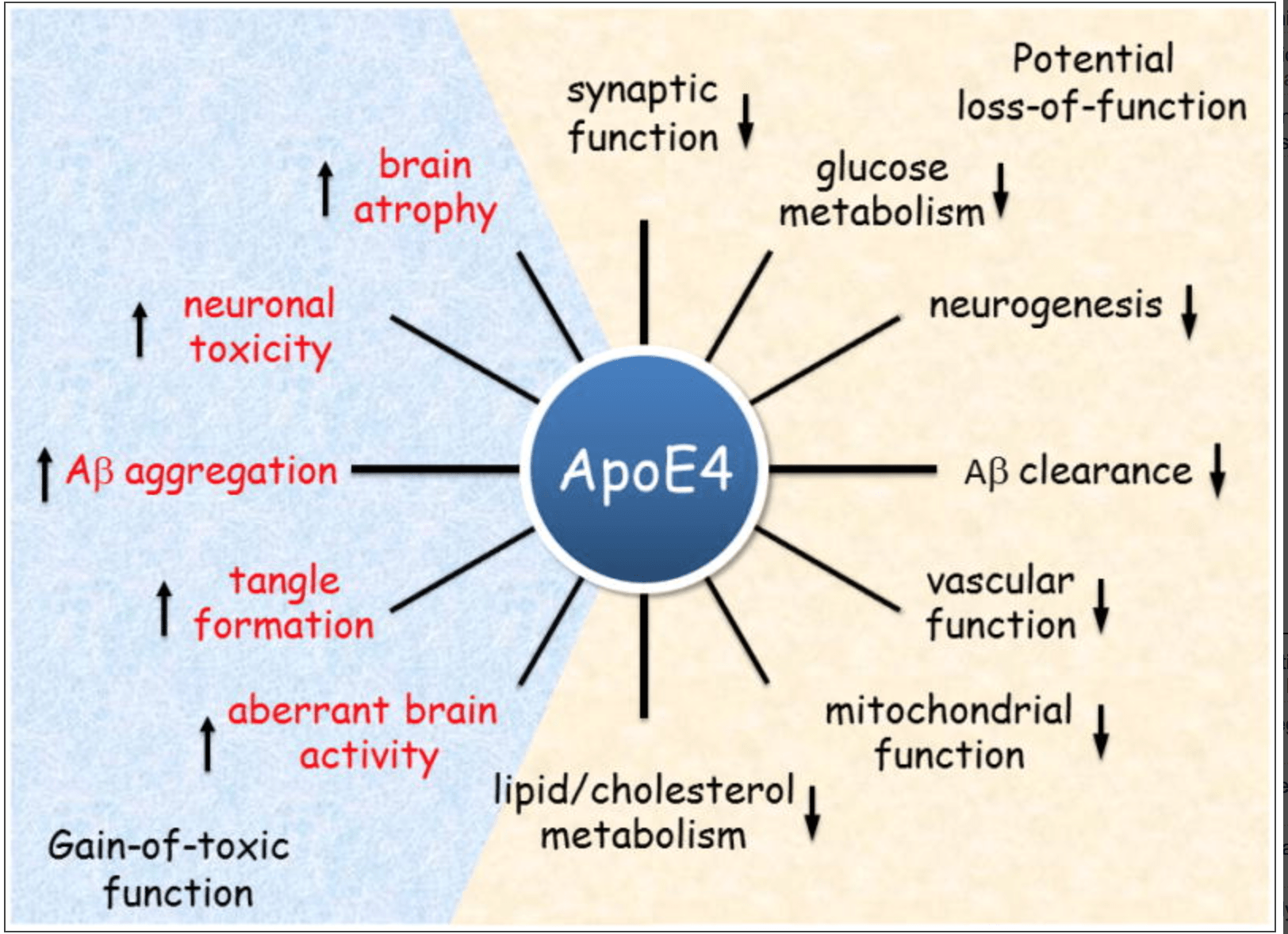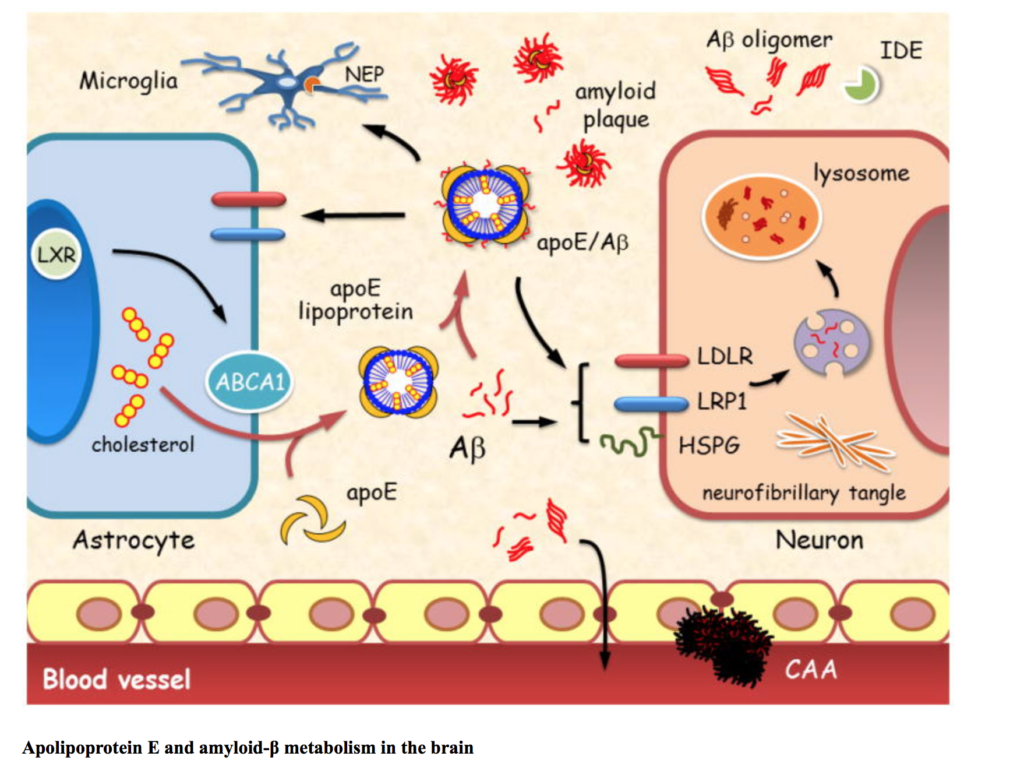Will I get Alzheimer's disease? Everything you need to know about the ApoE gene!
Alzheimer's disease (AD) is a progressive neurodegenerative disease that involves gradual cognitive decline. About 13% of people over 65 years old have Alzheimer's disease and nearly 45% of people over the age of 85 have it. (Source) Much evidence points to an imbalance in production and clearance of beta amyloid plaque in the brain. These toxic plaques injure neurons and lead to dementia and memory problems. The toxicity of amyloid depends on phosphorylated proteins called Tau. We now know there may be other triggers to amyloid production including toxic exposure and infections. Some of these include borrelia, herpes simplex type 1 and 2, chlamydia pneumonia, h. pylori and others. Early onset Alzheimer's disease typically occurs in patients less than 65 years old and may be related to gene mutations in APP, presenilin 1 and presenilin 2. However, the majority of Alzheimer's cases still occur in patients over 65 years old, commonly referred to as late-onset Alzheimer's disease or LOAD.
So what is ApoE?
ApoE regulates cholesterol by mediating transport from one tissue to another. In peripheral tissues, ApoE is primarily produced by the liver and macrophages and aids in transporting cholesterol. ApoE4 is associated with high cholesterol, heart disease and stroke as well as Alzheimer's disease. In the brain ApoE is mainly produced by astrocytes and transports cholesterol to neurons, causing abnormal transport of cholesterol in brain. Proper levels of cholesterol and transport of this substance is essential for proper memory. Studies show that ApoE 4 genotypes strongly affect deposition of beta amyloid forming senile plaques and cause cerebral amyloid angiopathy (CAA) where amyloid is deposited in the cerebral blood vessels. Both of these things are classic findings in the brains of those with AD. ApoE4 seems to have pro-inflammatory effect and decreased ability to thwart oxidative stress which could further exacerbate AD pathology.

Role of ApoE 4 in Alzheimer disease
ApoE 4/4 is a strong risk factor for Alzheimer's disease
Patients who have ApoE 4/4 have a very strong genetic risk for development of Alzheimer's disease. This association is weaker among African Americans and Hispanics and stronger in Japanese people compared with Caucasians. ApoE 4/4 is associated with high incidence of AD at a younger age. It is clear that this gene dramatically increases risk of development of AD. The frequency and average age of onset are as follows:
- ApoE 4 two copes – 91% and 68 years of age
- ApoE 4 one copy – 47% and 76 years of age
- ApoE non-carriers – 20% and 84 years of age
ApoE 4/4 is associated with impaired memory performance and increased risk of memory decline in middle-aged (40–59 years) and elderly (60–85 years) people with mild cognitive impairment (MCI). MCI is defined as a noticeable and measurable decline in cognitive abilities, including memory and thinking skills. Someone with MCI is at an increased risk of eventually developing Alzheimer's disease. Furthermore, recent research demonstrated that, independently of amyloid plaques, this gene triggers inflammatory cascades that cause brain dysfunction, including blood–brain barrier breakdown, leakage of blood-derived toxic proteins into the brain and reduction in the length of small vessels. Similar to “leaky-gut” this has often been called “leaky-brain”.
APOE and traumatic brain injury
Increasing evidence has shown that this gene is associated with worse outcomes following traumatic brain injury (TBI), regardless of the severity of initial injury. One study demonstrated that the outcome of TBI at six months after injury was much worse in ApoE4 carriers. More than one traumatic brain injury is associated with increased risk of AD. The poorer outcomes associated with ApoE4 might relate to its reduced ability to repair and remodel synapses and protect neurons upon injury compared with ApoE3.
Preventive of cognitive decline those with APOE 4 genetics
Dementia is negatively associated with higher education level, more leisure activity and less stress, and lack of cardiovascular risk factors, like healthy diet. Physical exercise was strongly associated with reduced risk compared to sedentary lifestyle. Recommendations if you happen to have ApoE 4 may include a mildly ketogenic diet Mediterranean style diet with focus on plant-based organic foods and coconut oil. In addition there are many antioxidants that may also protect the brain including the following:
- Tumeric
- Ginger
- Boswellia
- Quercetin
- Ashwaganda
- Bacopa
- Rhodiola
- Gingko
- Green Tea (ECGC)
- Resveritrol
- Coenzyme Q10
Regardless of if you find yourself a carrier of one or more copies of ApoE 4, you can still live a healthy lifestyle and incorporate many things that will decrease your risk of developing AD.
References
- Apolipoprotein E: far more than a lipid transport protein.
- Effects of age, sex, and ethnicity on the association between apolipoprotein E genotype and Alzheimer disease. A meta-analysis. APOE and Alzheimer Disease Meta Analysis Consortium.
- Gene dose of apolipoprotein E type 4 allele and the risk of Alzheimer's disease in late onset families.
- ApoE and Alzheimer's Disease, Risk, Mechanisms and Therapy
- The association between APOE genotype and memory dysfunction in subjects with mild cognitive impairment is related to age and Alzheimer pathology.
- Apolipoprotein E controls cerebrovascular integrity via cyclophilin A.
* These statements have not been evaluated by the Food and Drug Administration. The product mentioned in this article are not intended to diagnose, treat, cure, or prevent any disease. The information in this article is not intended to replace any recommendations or relationship with your physician. Please review references sited at end of article for scientific support of any claims made.




















21 Comments
I am APOE2/4 and have had MCI for 10+ years. After learning of my APOE4 status I started following Dr. Bredesen’s protocol for preventing AD last year. There are many interventions involved in this protocol, but the one which has helped me the most has been removal of my mercury amalgams followed by chelation using Dr. Andy Cutler’s protocol. It is well known that mercury accumulates in the brains of those with AD. There is an unproven hypothesis among some APOE researchers that APOE is involved in exporting mercury from brain cells and the APOE4 variant loses this ability because the thiol containing cysteine amino acid encoded by rs7412 is replaced by the amino acid arginine which doesn’t contain a thiol. Mercury is chemically attracted to thiol (sulfur + hydrogen).
Excellent, Matt! So glad you are doing well….
Dr. Jill, how to you view the association between APOE4 and mercury accumulation in the brain? I am also confused by various fews of the best types and amounts of fat consumption for those with APOE4 variants. Can you go into any more detail on this?
Matt, what you have said is intriguing. If the unproven hypothesis is indeed inaccurate, then what is the association and mechanism of action between APOE (4) and mercury? I have APOE3/4 and also had amalgams removed within the past year. I have been watching Andy’s protocol for some time but have not started it, as of yet.
I think APO e 3/3 may have more trouble with toxins and infections
Thank you Jill I find your site very informative.
I am copper toxic and have the gene MTHFR667. With chelated zinc and molybdenum I have been able to reduce the level. I am aware that the copper also affects the liver and brain and was also depositing copper into my tissue around my body causing me to have undiagnosed pain. My cholesterol is now high. It is very difficult to get the diet right. for reducing copper and cholesterol. Any suggestions?
Do you have Wilson’s disease? Zinc and molybdenum are excellent treatments. You might try a bile acid binder as well…
warmly
Dr Jill
Thank you for responding.
I have been told that Wilsons disease can only be ascertained by a liver biopsy is that true as no one has suggested one. Will ask the G.P. about a bile acid binder. Thanks again for your help. I live in Australia!
Dr. Jill
I’m a 35 yr old male and 2 years ago I started eating the Bulletproof diet and very strictly avoid gluten, sugars and refined carbs, focusing on organic vegetables and pastured animal protein. Every morning my breakfast consists of a 16-20oz bulletproof coffee with 1-2 tablespoons of grassfed butter and brain octane oil (sometimes add collagen protein). I feel great on the Bulletproof diet and even lost 25lbs back to normal BMI of 20. BUT, My Cholesterol has skyrocketed!
Total 322
LDL 218
Triglycerides 116 (this number did improve since the diet change)
HDL 62
Apo B 165
LDL-P 3299
Small LDL-p 1366
I recently did the 23andme saliva test and found to have APOE4 3/4 variant.
Everything I can find is that people with this variant need to eat a low fat diet. Is this correct and do I need to give up bulletproof coffee?
Hi Chad
If you have APO e4 variant you must be somewhat cautious about fat content in diet
warmly
Dr Jill
Since all those types of bacteria listed in the article can lead to Alzheimer’s, does that mean taking an antibiotic can reverse it?
Hi Jesse
It depends… usually there are many things that contribute so there is no silver bullet.
warmly
Dr Jill
What is the best test to have done to determine if you have this gene? Is it a regular blood test or a genetic test?
You can get APO gene from any lab, Quest or Labcorp or Mayo
Thank you!
Hi Dr. Jill,
Can you please recommend a doctor in the San Diego area that practices Functional Medicine. I have chronic stomach issues and have been to a zillion GI doctors to no avail!!
Sincerely,
Pamela Frischer
Oceanside, CA, 92056
805-348-3297
Hi Pamela
You may want to see Dr. Rahbar in LA http://www.laintegrativegi.com
warmly
Dr Jill
This post seems to say that the frequency of AD in the population of those having ApoE 4 two copies is 91% (and the average age of onset is 68)! Yikes! Am I reading that right? Do you have a reference for that? It’s really throwing me into a spin. I just learned I am Apoe 4/4 and the absolute risk I read previously was 65% by age 85. I have also read some more recent studies that said it was lower than that when measured and that those numbers were based on statistical models. 91% seems really too much! Barely a chance to escape it 🙁 I also found out I have a homozygous mthfr c677t mutation which I read somewhere increases alzheimer’s risk further. I’m a bit panicked and I now have access to my genome and am not sure what it means or what to do with it. I also have an autoimmune condition (hashimoto’s) and have had low vitamin D in the past. I have been on the elimination diet for 9 months and feel really good on it, but my LDL is creeping up…. I just read above though that those with my genes should watch out for fat. There is a ton of meat and fat in my diet now. What to do?!? I think it’s really time to find some help I can trust with all of this. I am in Southern Colorado. Can you recommend anyone who might help online? I can travel as well, even as far as Denver. Thanks very much for your help.
Hi Kelly – you might start by reading Dr. Dale Bredesen’s book, The End of Alzheimer’s. He describes a proactive way to prevent or treat the disease
warmly
Dr Jill
Kelly…are you my carbon copy? I am also 4/4, homozygous MTHFR677T and have Hashi’s!
Recently have been reading your cite as I was diagnosed with ABPA…Aspergillus. I took a 4 month treatment of Itraconazole 200mg 2x day. It only moved my Ige count of 485 to 460. I have severe asthma and have been treated with Xolair for several yrs. Would the activated Coconut Charcoal help ? Any other ideas ? Thanks much. d
You may need long term anti-fungals – this is not easy to eradicate.
Best to discuss with your immunologist or pulmonologist
warmly
Dr Jill
Share: